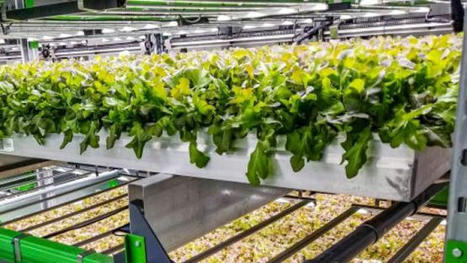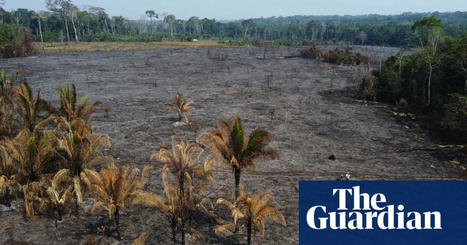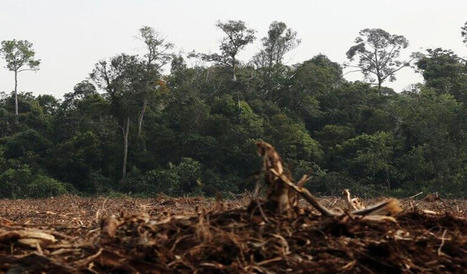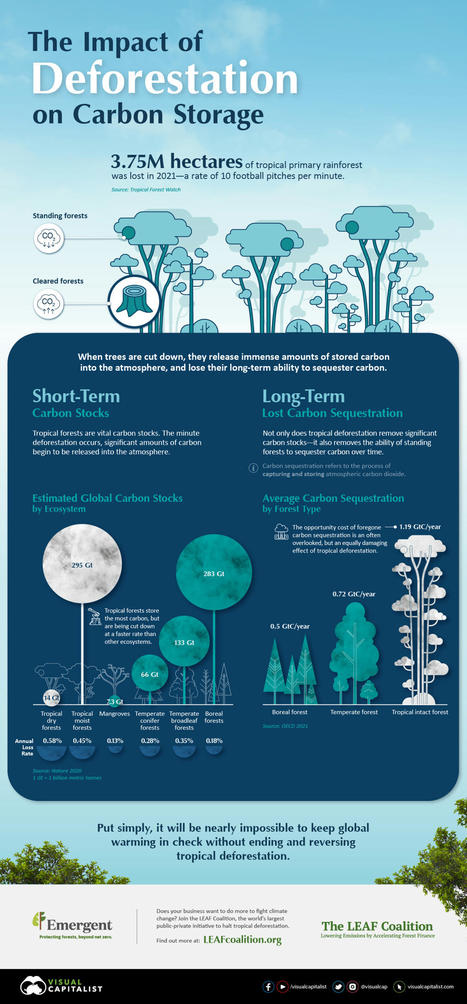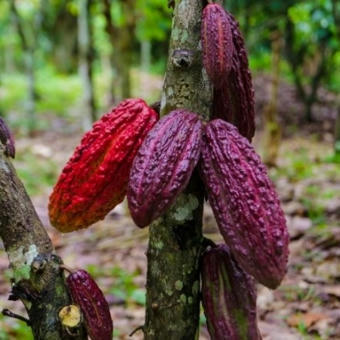 Your new post is loading...
 Your new post is loading...
A coalition of research organizations and civil society, the Forest Declaration Assessment, has conducted a new study that evaluates the progress toward eliminating deforestation by nations, companies and investors, as well as restoring 865 million acres of degraded land, by the end of the decade.
The report, “Off Track and Falling Behind,” shows that last year, progress worldwide on restoring and protecting forests worsened in some cases and moved too slowly overall.
Via EcoVadis
In the last two decades, many companies have made pledges to eliminate deforestation from their supply chains. Have these pledges been effective? New research published in the scientific journal Environmental Research Letters shows that when it comes to sourcing soy from the Amazon region, zero-deforestation pledges (ZDP)—made in support of Brazil’s Soy Moratorium, which banned sourcing soybeans produced on deforested land after 2006—have been mostly ineffective.
Conducted by researchers from the University of Cambridge, Boston University, ETH Zurich, and New York University, the research found that ZDP pledges were made by at least 94 companies through 2021, and the majority of these were not effectively implemented.
From 2006 to 2015, researchers found that these pledges reduced tree clearance in the Brazilian Amazon by only 1.6 percent—or approximately 2,300 km2, or an area that is smaller than Rhode Island, the smallest US state. After fossil fuels, deforestation is the second largest contributor of greenhouse gas emissions.
Via EcoVadis
Final negotiations have begun between the European Council, Parliament and Commission on a regulation that will ban products from the EU market that result from deforestation.
It will impact what is placed on supermarket shelves, and, importantly, retailers might be held accountable.
The proposal focuses on coffee, cacao, cattle, palm oil, soy and wood products. Among these commodities, the palm oil sector is at the forefront of sustainability, reaching 93% uptake of certified sustainable palm oil in Europe, even before legislation.
The core of the proposal requires that only products that are both legally produced and demonstrably free from deforestation should be allowed on the EU market.
To guarantee this, companies must submit a due diligence statement which states that the product is not only deforestation-free but also shows the exact plot of land where it originated.
This can be achieved by making the first importer (operator) responsible for this due diligence statement.
All subsequent actors who handle the product commercially (traders), such as retailers, would then ensure that the information they receive from the operator is correct.
Via EcoVadis
The country’s most sustainably minded retailers are placing more of an emphasis on sourcing — by both boosting locally and sustainably produced food and by requiring stricter environmental standards from their suppliers. This ranges from sourcing more sustainable seafood, including canned tuna, to ensuring that beef is being produced with no deforestation. Palm oil, coffee, eggs, soy and pulp are other commodities that are being more closely watched by grocers to ensure sustainable production.
In fact, the 2022 Sustainability Barometer released by London-based Mintel finds that from a global consumer perspective, concerns about water and food shortages are now being prioritized ahead of previous preoccupations with waste and plastic. Therefore, it makes sense for grocers to include messaging about their efforts in more sustainable sourcing and in combating climate change.
Several retailers, including Batavia, Ill.-based Aldi US, are committing that all of the fresh, frozen and farmed seafood they purchase will be third-party certified as sustainable or from fishery improvement projects by the end of 2025. Meanwhile, expect to see more of these grocers ramp up tracing efforts so that customers will also recognize their efforts in sustainability.
Via EcoVadis
Indigenous leaders from the Amazon have implored major western brands and banks to stop supporting the ongoing destruction of the vital rainforest through mining, oil drilling and logging, warning that the ecosystem is on the brink of a disastrous collapse.
Representatives of Indigenous peoples from across the Amazon region have descended upon New York this week to press governments and businesses, gathered in the city for climate and United Nations gatherings, to stem the flow of finance to activities that are polluting and deforesting large areas of the rainforest.
Via EcoVadis
Louis Dreyfus Company (LDC) has ramped up its sustainability journey by pledging to eliminate deforestation and converting to native vegetation from its supply chain by the end of 2025.
An important enabler of the group’s biodiversity conservation and decarbonisation targets, the commitment is in continuity with initiatives like the creation of a dedicated Carbon Solutions Platform.
The merchant and processor of agricultural goods also recently introduced product-specific sustainability codes and policies to conserve forests and native vegetation for commodities considered to be higher risk in relation to deforestation – namely, palm oil, coffee and soy.
Via EcoVadis
Non-profit hails record year for climate, deforestation, and water risk reporting, as investor-backed group eyes plans to cover land and ocean data
Record numbers of companies, cities, states, and regions have reported their climate change, water security, and deforestation data to CDP in 2020, despite the disruption caused to the global econom
Via EcoVadis
US-based clothing conglomerate VF Corporation has adopted its first-ever forestry policy, aimed at eliminating deforestation and human rights abuses from its supply chain.
Via EcoVadis
|
A law passed by the European Parliament requires companies working in cattle, cocoa, coffee, palm oil, rubber, soy and wood to demonstrate their products aren’t sourced to deforested land or land with forest degradation, or else risk heavy fines.
Companies will have to submit “due diligence” reports showing they took proper steps to verify the origins of their products while also complying with countries’ local regulations on human rights and impacts on Indigenous people.
Critics say the legislation may still lack the teeth to prevent deforestation, especially if political pressure from traders forces EU countries to overlook their noncompliance with the new regulations.
Via EcoVadis
The Impact of Deforestation on Carbon Storage
A one degree change in temperature could have catastrophic consequences.
One of the most notable influences on rising global average temperatures comes from deforestation. In fact, combined emissions from deforestation are higher than the annual emissions of any other country (apart from the U.S. and China) and contribute to roughly 12% of total annual greenhouse gas emissions.
This graphic from The LEAF Coalition takes a closer look at the impact deforestation has on global greenhouse gas emissions through carbon storage.
Via EcoVadis
Imports of 14 types of commodities into the European Union will soon have to be verified for possible association with deforestation in the countries in which they were produced.
That’s the key provision in a bill passed on Sept. 13 by the European Parliament, which initially targeted soy, beef, palm oil, timber, cocoa, and coffee, but now also includes pork, lamb and goat meat, as well as poultry, corn, rubber, charcoal, and printed paper.
The bill still needs the approval of the Council of the EU and the national parliaments of the 27 countries in the bloc, but is already considered a historic step against deforestation.
In Brazil, experts have welcomed the bill as a means of tackling the demand-side pressures driving increasing levels of deforestation in the Amazon Rainforest, while the agribusiness lobby has denounced it as unfair.
Via EcoVadis
The European Cocoa Association (ECA) and the Association of Chocolate, Biscuit and Confectionery Industries of Europe (CAOBISCO) are on track to deliver access to cocoa marketing agencies’ farming data that the Associations’ Members have collected over the years.
According to the organizations, this data collection effort should feed into a combined database owned and driven by producing countries, in compliance with EU and national data privacy legislation, to achieve a robust nationwide traceability system.
Speaking to FoodIngedientsFirst, Christiaan Prins, chairman of the European Cocoa Association Sustainability Working Group, says farm data collection is crucial to building a sustainable cocoa supply chain.
“Understanding where cocoa is farmed is a precondition to prevent cocoa from being sourced from protected or deforested areas. In addition, farm data allows companies to support cocoa farmers with tailor-made development plans for their farms. Combining the data from different companies with cocoa origin government-owned data will greatly add to the transparency of the cocoa supply chain.”
Via EcoVadis
EU action on tackling deforestation is urgently needed, as rising demand for commodities is exacerbating pressure on land worldwide. To have an impact on deforestation rates, the EU cannot act alone nor focus exclusively on cleaning its own supply chains.
In 2021, the European Commission took the important step of responding to the European Parliament’s call to address EU driven deforestation by adopting a Proposal for a Regulation on deforestation-free supply chains.
Yet if the EU wishes to make a difference in driving global deforestation rates down, it will need to engage with producing countries to address the root causes of deforestation, from forest governance to poverty. Just as importantly, to have meaningful impact on halting deforestation the EU must look beyond the cleaning of its own supply chains and ensure there are accompanying measures in place to maintain positive action in producer countries.
Via EcoVadis
Palm oil, a crop synonymous with deforestation and community conflicts in Southeast Asia, is making inroads in the Brazilian Amazon, where the same issues are playing out.
Indigenous and traditional communities say the plantations in their midst are polluting their water, poisoning their soil, and driving away fish and game.
Scientists have found high levels of agrochemical residues in these communities — though still within Brazil’s legal limits — while prosecutors are pursuing legal cases against the companies for allegedly violating Indigenous and traditional communities’ rights and damaging the environment.
Studies based on satellite imagery also disprove the companies’ claims that they only plant on already deforested land.
Via EcoVadis
Emerging technologies offer some fascinating possibilities for fighting climate change, but the benefits go even further in many cases. For instance, research from PwC found that using AI in environment management applications such as clean energy grids, precision agriculture, and predictive weather and disasters could contribute over $5 trillion to the economy by 2030.
Via EcoVadis
|



 Your new post is loading...
Your new post is loading...





